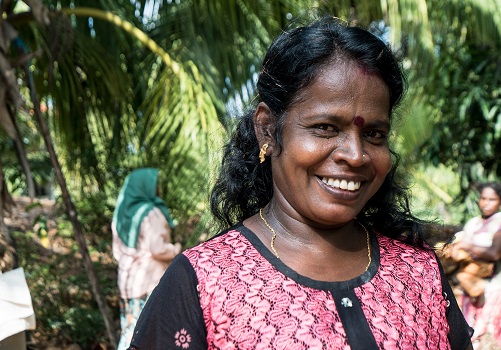For almost one billion women worldwide, having a basic bank account is beyond their reach. I recently met Sawsan in Jordan, where she runs her own sewing workshop with four other women. Their business is growing, and the orders are flowing in. But Sawsan has no bank account.
We know that a lack of access to finance is one of the major barriers facing women entrepreneurs in marginalised communities across the world. The women entrepreneurs we, at CARE, work with every day tell us, and so do the statistics: 80 per cent of women-owned businesses with credit needs are either unserved or underserved. This is equivalent to a massive $1.7 trillion financing gap.
When a woman wants to start or grow her own business, the odds of securing a business loan are heavily stacked against her. This affects women like Yeo from Ivory Coast, who was unable to take out a loan for her farming business because, as a woman, she did not own any land that the bank required as collateral.
Requesting collateral excludes women
As we search for a solution to the inequality between men and women in accessing finance around the world, the answer could be simple: stop asking for collateral. Most financial systems have been designed by and for men. Therefore, when a person requires a business or personal loan, the lender asks for collateral, such as land or a house. In many cultures, it is men who traditionally own the land or the house, which immediately excludes women. Gender disparities reflect a mix of social, cultural and legal barriers to women’s participation in the financial system.
As my good friend Akin Adesina, President of the African Development Bank, recently stated, “While societal limitations and belief systems often kill many a woman’s dream, it is often at the bank counter that dreams come crashing down. Without collateral and without access to land or other financial resources, the bank is the end of the road for many women entrepreneurs. This is a status quo that must change – Not because it’s charity or the right thing to do – although it most certainly is the right thing to do – but because it’s the smart thing to do. It’s the strategic thing to do.”
Alternatives to collateral
But what will reassure financial institutions that they will get their money back? First, it is knowing that women are a high-value investment. Evidence shows that women are stronger savers than men, more responsible borrowers and calculated risk-takers. According to recent research from the Bank of New York Mellon, giving women better access to finance could unlock $330 billion in annual global revenue.
Second, it is about financial institutions thinking outside the box and relying on other methods to credit-check an individual, such as issuing loans based on cash flow, savings group history, mobile phone transaction history or a track record of enterprise performance.
Learning how to save
Saving is a vital foundation for economic independence. Back in 1991, CARE pioneered a flagship savings programme – the Village Savings and Loans Association. Since then, these savings groups have directly supported nearly 7 million members, the majority of whom are women, across 45 countries and have created pathways for nearly one million members to open their first bank account. We train members of these savings groups to keep track of all deposits and withdrawals, which can prove to be a vital record of a person’s ability to save and repay a more formal loan.
By working with women on ways to collectively save money, develop their business skills and by facilitating access to affordable loans, we have seen an astounding uplift in success rates. In Ethiopia, CARE recently supported 5,000 women entrepreneurs in this way, resulting in an increase in their income of 500%. At the start or the project 70% of the women had no savings and by the end, this shrunk to 3.6%. Through our partnership with a microfinance provider, many of the Ethiopian women were also able to access low-interest loans, which they are now successfully repaying.
Collateral is not the only barrier that women are facing in trying to access financial services. However, I believe that changing the goalposts around collateral for women is a good place to start.
Calling on banks to invest in women
So why are there not more banks investing in women? There are two main reason: First, the banks are unable to reach many of the women and, second, the banks find it difficult to understand women’s priorities and needs. That is why we at CARE want to work with more financial institutions to share our expertise, reach and practical guidance so that we can start to level the playing field of financial access.
Our Access Approved campaign puts a spotlight on this issue, calling on financial institutions to do their part by developing products and services that specifically meet the needs of marginalised women.
I am therefore calling on the banks to rise to this challenge, rethink their approach and create equal access and opportunities for women around the globe. We cannot overcome poverty until both men and women have equal rights and opportunities. This approach makes financial sense for everyone.
Caroline Kende-Robb is the Secretary General of CARE International


